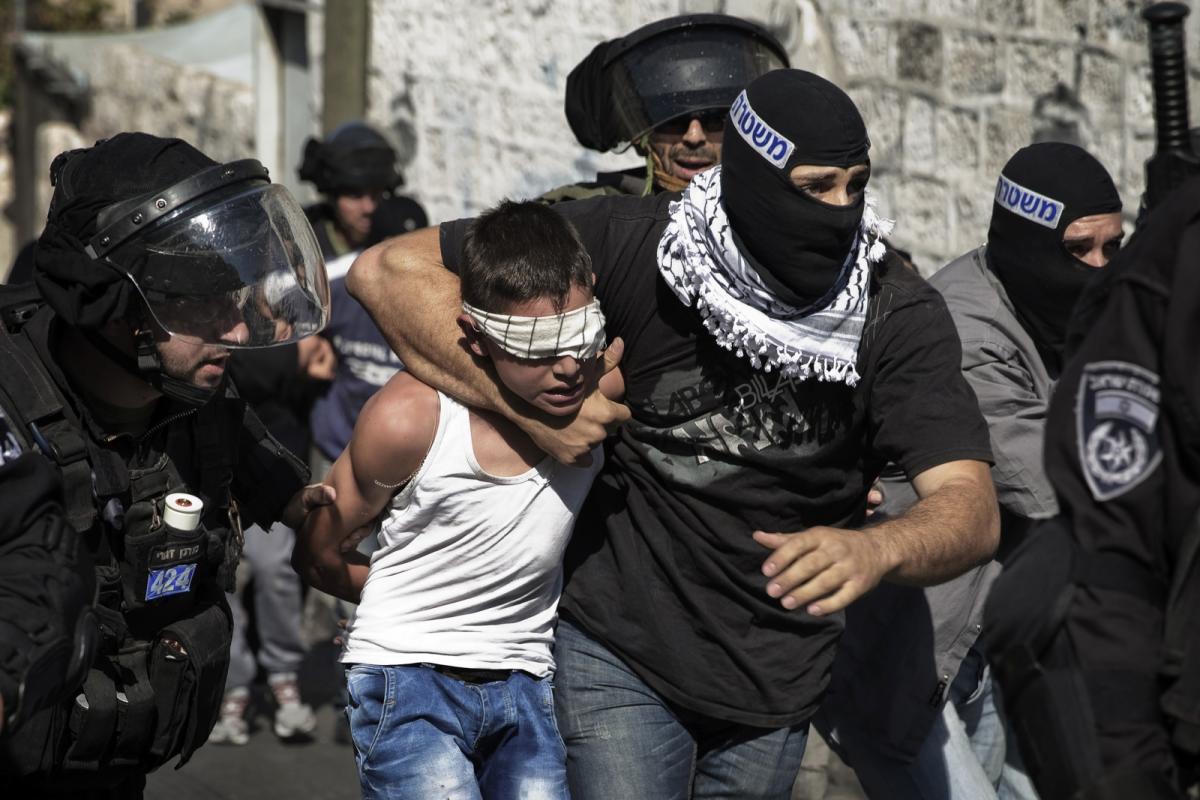IMPRISONMENT OF CHILDREN
December 2017
Approximately 700 Palestinian children under the age of 18 from the occupied West Bank are prosecuted every year through Israeli military courts after being arrested, interrogated and detained by the Israeli army. The most common charge levied against children is throwing stones, a crime that is punishable under military law by up to 20 years in prison. Since 2000, more than 12,000 Palestinian children have been detained.
Data and Statistics Pertaining to Detainment of Children 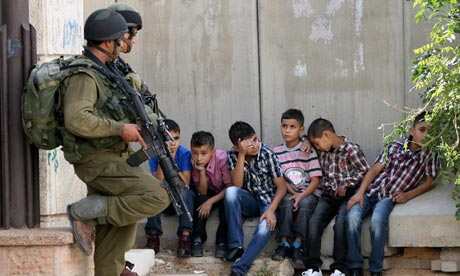
The year 2015 witnessed an increase in the number of Palestinian children (as defined as individuals under 18), who were arrested during the October a popular uprising started in the occupied Palestinian territory in response to the Israeli occupation’s widespread human rights violations and escalation at Al-Aqsa Mosque as well as the ever-growing settlement activity and complete impunity to crimes by settlers, the latest of which was the arson and murder of the Dawabsheh family in Duma, Nablus. In response to the recent events, Israeli occupation forces (IOF) intensified human rights violations against Palestinians including mass arrests, leading to an increase in the number of children held in Israeli detention. With the surge in arrests, the number of Palestinian children in Israeli detention nearly doubled to 307 at the end of October 2015 compared with 155 at the end of August 2015. Official Palestinian statistics indicate the arrest of over 929 children in 2015, a sharp increase compared with the number of children arrested in previous years. The occupation forces continued in their policy of arrest of Palestinian children, denying protection due to them by more than 27 international conventions. In this context, since the Aqsa Intifada of 2000, the occupation forces arrested more than 12,000 Palestinian children.
The occupation forces have arrested Palestinian children systematically, and within arrest campaigns for collective punishment. These children are subjected to different forms of psychological and physical torture, and are not afforded protection. The occupation forces exploit the arrest of children for purposes of recruiting them to work as informants, extort their families financially, and force their families to pay large financial fines to secure their release. The arrest of children has a destructive impact on the level of children’s mental health, often leading to children’s drop-out from schools.
Number of Imprisoned Children Between Jan 2010 - December 2017
|
Month |
Jan |
Feb |
March |
April |
May |
June |
July |
Aug |
Sept |
Oct |
Nov |
Dec |
|
2017 |
300 |
300 |
300 |
300 |
320 |
300 | 300 | 280 | 311 | 350 | ||
|
2016 |
450 |
406 |
- |
- |
414 |
- |
350 |
340 |
400 |
|||
|
2015 |
152 |
163 |
182 |
182 |
164 |
162 |
160 |
153 |
156 |
320 |
420 |
470 |
|
2014 |
154 |
183 |
210 |
202 |
196 |
200 |
192 |
200 |
201 |
182 |
163 |
156 |
|
2013 |
193 |
219 |
185 |
236 |
236 |
222 |
194 |
195 |
180 |
179 |
159 |
173 |
|
2012 |
166 |
166 |
183 |
203 |
218 |
192 |
220 |
210 |
194 |
189 |
164 |
177 |
|
2011 |
209 |
221 |
216 |
224 |
217 |
211 |
201 |
176 |
262 |
150 |
159 |
|
|
2010 |
318 |
343 |
342 |
355 |
300 |
286 |
281 |
280 |
269 |
264 |
251 |
225 |
Children detained in the West Bank are treated in accordance with the military orders issued by the military commander of the area. In the forefront is military order 1651, which includes “security provisions” used by the occupation forces in the treatment of Palestinian security prisoners. Article 212 (2) of order 1651 identified the penalty of stone throwing on persons or property (the charge levied against the vast majority of detained Palestinian children) at imprisonment for 10 years, while article 212 (3) identified the penalty of imprisonment for 20 years if the stone thrower targeted a moving vehicle, and with the intent of causing harm to subjects inside the vehicle.
Military Laws and Orders and Legal Changes Pertaining to Arrest of Children in the West Bank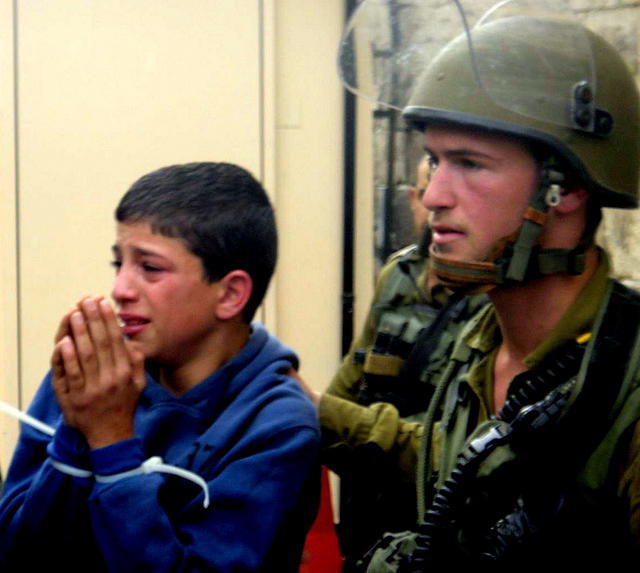
Some military orders, or articles therein, are specialized for the military courts of the occupation state; for example, military order 1711 of the year 2013, allows for the detainment of a child, whose age falls between 12-13 for a period of 24 hours before referral to the court, while the period reaches 48 hours for children between 14-15; this could be extended to up for 96 hours by the police of the occupation for purposes of interrogation in the cases of that have emergency reasons. As for children between 16-18, their detainment period may reach 96 hours without referring them to court, which is exactly the same treatment adult detainees receive. The period of preventative detention of children before submitting an indictment may be extended to 15 days in necessary cases with the purpose of interrogation, as per military order 1726 of the year 2013; the military court may extend the detention for a period of 10 days each time, for a maximum total of 40 times; thereafter, the only body authorized with giving extensions is the military court of appeal.
Additionally, military order 1727 of the year 2013 specifies procedures followed in juvenile military courts. Among these procedures is the appointment of a lawyer by the court and the presence of the child’s parents in the court sessions. The order also included the creation of detention centers and special military courts for juveniles. Additionally, military order 1727 specified the age of children to be any person less than 18. Military order 1745, issued in the year 2014, specified that interrogation sessions of children should be audio-visually recorded, and should be undertaken in a language understood by children. However, military order 1745 excluded children arrested within security pretexts, allowing the occupation forces to deny all of the aforementioned rights under security cases.
Detainment of Jerusalemite Children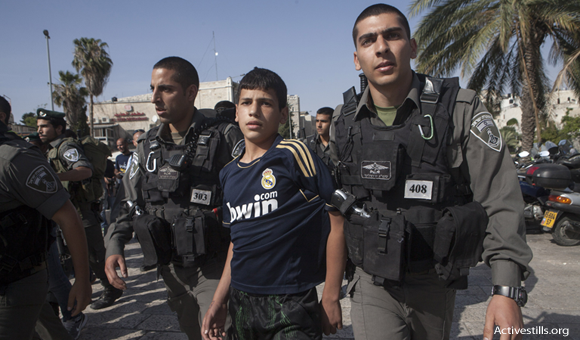
Regarding Palestinian children arrested in Jerusalem, the Israeli Juvenile Law of 1971 applies to them. The Israeli courts introduced a substantive change in its policies in dealing with detained Jerusalemite children, following protests and clashes that erupted in occupied Jerusalem after the kidnapping and burning of child Mohammad Abu Khdeir.
During the first half of 2014, the court would release children who were detained under allegations of stone throwing or participation in clashes, without waiting for the report of the Discipline Officer based on article 10 (A) of the Israeli Juvenile Law of 1971, which applies to Jerusalemite children. This law requires the court to take all necessary measures and procedures to refrain from arresting children or perpetuating their arrest.
This was not the only change; in the past, the rulings of underage detainees accused of stone throwing without causing injuries ranged between acquittal or conviction with a suspended sentence and a fine. After 12 June the court started to convict children and incarcerate them for a period of 2 months to 3 months and a half.
In an interview for the purposes of this report, the attorney of Addameer Mr. Mohammad Mahmoud explained the difference between judicial rulings against Jerusalemite children as follows:
“Since 2010 and until the end of 2013, the Israeli court used to release underage stone throwers without waiting for the report of the Discipline Officer; the ruling used to be issued without condemnation of legal address as per the Juvenile Law of 1971, and particularly article (10/A), with a bail ranging between 1,000-4,000 Israeli Shakels. Around the end of 2013 the Israeli prosecution submitted an appeal to the central court in Jerusalem with the purpose of tightening the penalty on stone throwers. The court accepted the appeal and was able through it to issue an order that tightens the judicial punishment of stone throwers. This was the beginning of the change in convicting children, in addition to receiving a suspended sentence, and a bail. With the beginning of 2014, this situation persisted, except for some exceptional cases, including the inability of the parents of paying the bail, or the refusal of the child of house arrest and preferring doing actual jail time. Only in these two cases children were incarcerated.”
The attorney explains: 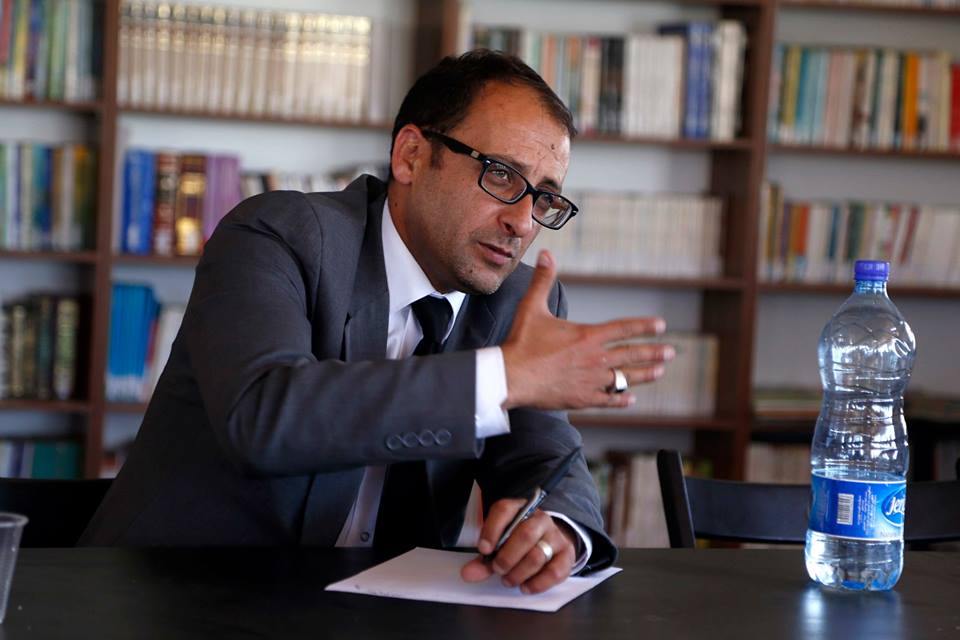
“In the midst of the vast arrest campaign undertaken by the occupation forces following the killing of Mohammad Abu Khdeir, Israeli courts started to change its judicial policy in refusing to grant requests of release of children before the issuing of the report of the Discipline Officer, which requires 20-25 days, and without releasing them after the issuing of the report. This made parents prefer not to wait for the issuing of the report and request lawyers to make deals with the prosecution, such that the child spends 2-3 months in jail, and avoid the procedures that entail hearing the testimonies of witnesses, which require 4-5 months. This has practically led to the incarceration of numerous children under allegations of committing security offenses without verifying their occurrence of the perpetrator. Nowadays, courts do not accept to release children to their houses in the period preceding conviction; instead, the ruling is house arrest away from his place of living, where is not allowed to go to school; this is coupled with the paying of a bail.
|
2012: Israeli courts in Jerusalem ruled mainly the penalty of house arrest of children without a report from the Discipline Officer. 2013: The military courts began to rule for house arrests for Jerusalemite children away from their home following the issuing of the report of the Discipline Officer. The issuing of the report requires 20-25 days. 2014: Israeli courts, following the events that took place in the summer, tightened penalties against children (14-18) who were indicted, and did not release any of them, neither before nor after the issuing of the report of the Discipline Officer. 2016: The Israeli Knesset passed a law allowing the imprisonment of minors under the age of 14 if convicted of murder. The law, which will be temporarily in affect for three years, allows the court to detain minors under the age of 14 in a closed facility and transfer them into prison upon reaching 14 years old to serve the remaining of their sentences. |
Indicators and Characteristics of Arrested Children:
From scientific and developmental perspectives, experts in child trauma psychology believe that the arrest, interrogation, and humiliation experience is highly dangerous and traumatizing to a child. The trauma can alter the child’s behavior in what can be characterized with agitation, over reaction, rebellion, or indifference to surroundings. Traumatic experiences in the early stages of a child’s life (particularly during childhood and adolescence) increase the risk of psychological and behavioral disorders during adulthood.
Statistics on child arrests and interrogation showcase that Israeli forces target children in formative years as arrests mainly target adolescents. Psychologists in the Rehabilitation Center for Victims of Torture point out that a child’s balanced character forms during adolescence. However, the experience of arrest results in the child losing his trust and protection sources, as well being pulled away from his family. Thus the experience disrupts the character formation process and alienates the child from his family and society.
The age group of the targeted children shows that the child’s educational process is interrupted at a critical stage with the majority of them having finished primary school and on their way to the final stages of secondary school. Arrest, interrogation, or house arrest – even for several months- can damage beyond repair years’ worth of studies. The Rehabilitation Center for the Victims of Torture observed that the majority of these children drop out before they finish their secondary education. Children are among the weak and marginalized groups, and are considered the most vulnerable to torture and degrading treatment. Trauma among children leaves short and long term effects for a number of factors, including:
First - Unexpectedness: Torture is one cause of trauma, and perhaps the most complicated. Psychological trauma results from an unexpected, sudden extreme event outside the realm of the normal human experience, resulting in certain reactions and symptoms. Trauma symptoms can be temporary, or can escalate into chronic physical symptoms.
Second – Personal Factors: These factors relate to gender, age, and level of education. A child lacks enough experience and expertise to cope with traumatic events, thus the children are most vulnerable to leading questions and the various interrogation methods. The children are also more prone to manipulation and deceit than adults. Neuropsychology research indicates differences among children, adolescents, and adults in levels of maturity and cognitive abilities, particularly with regards to decision-making since the process of making decisions is highly susceptible to various psychological, analytical, and cognitive factors.
Third – Tendency to believe figures of authority: In ordinary circumstances, children and adolescents operate primarily within the authority of dominating figures (usually the father, teacher, or police officer). Given the patriarchal nature of society, children and adolescents are inclined to follow the father, family, or clan. As a result of the extraordinary circumstance of interrogation, the targeted group lacks the free will to defy instructions and demands, or resist coercion.
Threats of Sexual Violence
More than one interrogator threatened to rape me, saying “if you don’t want to talk from your mouth we’ll make you talk from elsewhere.” I felt very scared and confessed to something that I didn’t do and that never happened.
House Arrests of Jerusalemite Children
The Magistrate Court ruled in the case of child Mahmoud Ramadan Obeid (17 years old) 6 months of house arrest for the charge of stone-throwing. He is a resident of Assawyie and a student in 11th grade in the Abdullah Ibn Al-Hussein in Skeikh Jarrah. The child told field researcher of Addameer:
I still suffer from the impact of house arrests and going to the center. Despite the fact that my father paid a 5000 shekel bail, the case is not over. My house arrest is now affecting the small details of my life, where my academic achievement has declined, and I feel lonely because I can’t play with my friends in the neighborhood. I started to feel that the Israeli forces are watching me every moment, which psychologically bothers me. I don’t know until when I’ll stay like this.
ACCESS TO EDUCATION
RECRUITMENT CONCERNS
